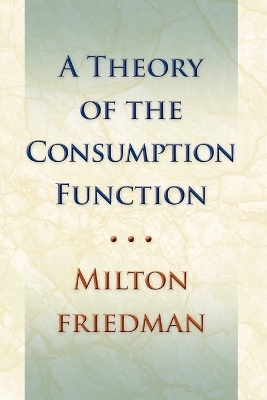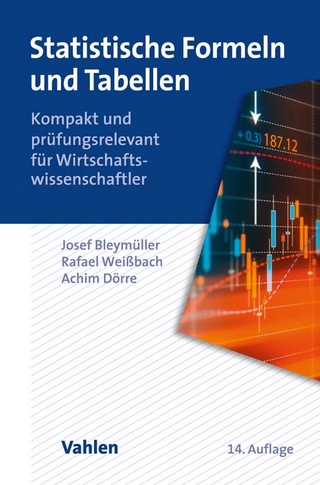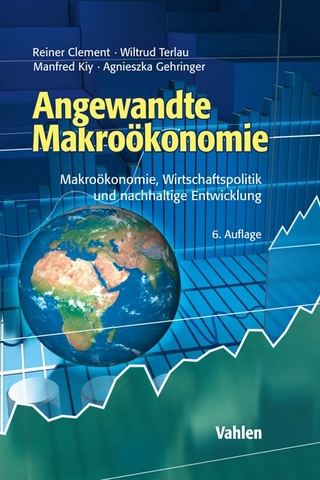
Theory of the Consumption Function
Princeton University Press (Verlag)
978-0-691-13886-2 (ISBN)
- Lieferbar (Termin unbekannt)
- Versandkostenfrei innerhalb Deutschlands
- Auch auf Rechnung
- Verfügbarkeit in der Filiale vor Ort prüfen
- Artikel merken
What is the exact nature of the consumption function? Can this term be defined so that it will be consistent with empirical evidence and a valid instrument in the hands of future economic researchers and policy makers? In this volume a distinguished American economist presents a new theory of the consumption function, tests it against extensive statistical J material and suggests some of its significant implications. Central to the new theory is its sharp distinction between two concepts of income, measured income, or that which is recorded for a particular period, and permanent income, a longer-period concept in terms of which consumers decide how much to spend and how much to save. Milton Friedman suggests that the total amount spent on consumption is on the average the same fraction of permanent income, regardless of the size of permanent income. The magnitude of the fraction depends on variables such as interest rate, degree of uncertainty relating to occupation, ratio of wealth to income, family size, and so on. The hypothesis is shown to be consistent with budget studies and time series data, and some of its far-reaching implications are explored in the final chapter.
Milton Friedman (1912-2006) was awarded the Nobel Prize in Economics in 1976. He was a Senior Research Fellow at the Hoover Institution and had previously taught at the University of Chicago from 1946 to 1976. He was also a member of the research staff of the National Bureau of Economic Research from 1937 to 1981.
Preface ix CHAPTER I: Introduction 3 CHAPTER II:. The Implications of the Pure Theory of Consumer Behavior 7 1. Complete Certainty 7 2. The Effect of Uncertainty 14 a. The Indifference Curve Diagram 14 b. Motives for Holding Wealth 0 16 3. The Relation between the Individual and the Aggregate Consumption Function 18 CHAPTER III: The Permanent Income Hypothesis 20 1. The Interpretation of Data on the Income and Consumption of Consumer Units 21 2. A Formal Statement of the Permanent Income Hypothesis 25 3. The Relation between Measured Consumption and Measured Income 31 CHAPTER IV: Consistency of the Permanent Income Hypothesis with Existing Evidence on the Relation between Consumption and Income: Budget Studies 38 1. Temporal Changes in Inequality of Income 39 2. Consumption-Income Regressions for Different Dates and Groups 40 a. Temporal Differences 44 b. Differences among Countries 54 c. Consumption of Farm and Nonfarm Families 58 d. Occupational Characteristics of Families 69 e. Negro and White Families 79 f. A Digression on the Use of- Partial Correlation in Consumption Research 85 3. Savings and Age 90 4. The Effect of Change in Income 97 a. The FSA Data 101 b. The Survey of Consumer Finances Data 104 c. The Significance of the Comparisons 108 Appendix to Section 4: The Effect of Change in Income on the Regression of Consumption on Income 109 1. Permanent Income Change of Same Absolute Amount 109 2. Permanent Income Change of Same Percentage 113 CHAPTER V: Consistency of the Permanent Income Hypothesis with Existing Evidence on the Relation between Consumption and Income: Time Series Data 115 1. Recent Long-period Estimates of Aggregate Savings for the United States 116 a. Their General Pattern 1 16 b. The Constancy of k* 119 2. Regressions of Consumption on Current Income 125 a. Effect of Period Covered 125 b. Effect of Form of Data 129 c. The Relation between Time Series and Budget Elasticities 134 3. Regressions of Consumption on Current and Past Income 137 a. Functions by Modigliani, Duesenberry, and Mack 137 b. Alternative Functions Fitted to Data for a Long Period 142 Appendix to Section 3: Effect on Multiple Correlation of Common Errors in Measured Consumption and Current Income 152 CHAPTER VI: The Relation Between the Permanent Income and Relative Income Hypotheses 157 1. Relative Income Status Measured by Ratio of Measured Income to Average Income 160 2. Relative Income Status Measured by Percentile Position in the Income Distribution 163 3. The Basis for the Relative Income Hypothesis 167 4. The Relative versus the Absolute Income Hypothesis 169 a. Continuous Budget Data 170 b. Geographical Budget Comparisons 173 c. Summary. Evaluation of Evidence 181 CHAPTER VII: Evidence from Income Data on the Relative Importance of Permanent and Transitory Components of Income 183 1. A Method of Estimating 184 2. Empirical Evidence on 188 3. Comparison of Estimates of with Estimated Income Elasticity of Consumption 190 4. Correlation of the Ratio of Savings to Income in Consecutive Years 196 Appendix: Correlation between Savings Ratios in Two Consecutive Years 197 CHAPTER VIII: A Miscellany 200 1. Regression of Income on Consumption . 200 2. Application of Permanent Income Hypothesis to Individual Categories of Consumption 206 3. Relevance to the Analysis of the Distribution of Income 209 4. Connection between the Permanent Income Hypothesis and the Distribution of Wealth 210 5. Additional Tests of the Permanent Income Hypothesis 214 CHAPTER IX: Summary and Conclusion 22Q 1. Summary Statement of Hypothesis 222 2. Evidence on the Acceptability of the Permanent Income Hypothesis 224 3. Generalizations about Consumer Behavior Based on the Hypothesis 226 4. Implications of the Hypothesis for Research 230 5. Substantive Implications of the Hypothesis 233 a. Economic Development 233 b. Economic Fluctuations 236 Index 241
| Erscheint lt. Verlag | 17.8.2008 |
|---|---|
| Verlagsort | New Jersey |
| Sprache | englisch |
| Maße | 152 x 235 mm |
| Gewicht | 369 g |
| Themenwelt | Wirtschaft ► Allgemeines / Lexika |
| Wirtschaft ► Volkswirtschaftslehre ► Makroökonomie | |
| ISBN-10 | 0-691-13886-9 / 0691138869 |
| ISBN-13 | 978-0-691-13886-2 / 9780691138862 |
| Zustand | Neuware |
| Haben Sie eine Frage zum Produkt? |
aus dem Bereich


